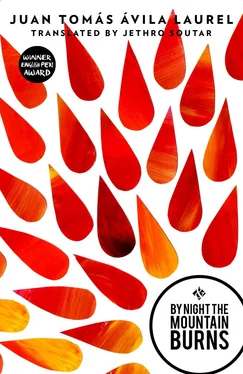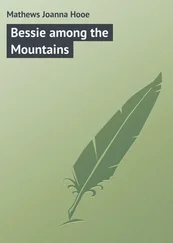Juan Ávila Laurel - By Night the Mountain Burns
Здесь есть возможность читать онлайн «Juan Ávila Laurel - By Night the Mountain Burns» весь текст электронной книги совершенно бесплатно (целиком полную версию без сокращений). В некоторых случаях можно слушать аудио, скачать через торрент в формате fb2 и присутствует краткое содержание. Год выпуска: 2014, Издательство: And Other Stories Publishing, Жанр: Современная проза, на английском языке. Описание произведения, (предисловие) а так же отзывы посетителей доступны на портале библиотеки ЛибКат.
- Название:By Night the Mountain Burns
- Автор:
- Издательство:And Other Stories Publishing
- Жанр:
- Год:2014
- ISBN:нет данных
- Рейтинг книги:5 / 5. Голосов: 1
-
Избранное:Добавить в избранное
- Отзывы:
-
Ваша оценка:
- 100
- 1
- 2
- 3
- 4
- 5
By Night the Mountain Burns: краткое содержание, описание и аннотация
Предлагаем к чтению аннотацию, описание, краткое содержание или предисловие (зависит от того, что написал сам автор книги «By Night the Mountain Burns»). Если вы не нашли необходимую информацию о книге — напишите в комментариях, мы постараемся отыскать её.
By Night the Mountain Burns — читать онлайн бесплатно полную книгу (весь текст) целиком
Ниже представлен текст книги, разбитый по страницам. Система сохранения места последней прочитанной страницы, позволяет с удобством читать онлайн бесплатно книгу «By Night the Mountain Burns», без необходимости каждый раз заново искать на чём Вы остановились. Поставьте закладку, и сможете в любой момент перейти на страницу, на которой закончили чтение.
Интервал:
Закладка:
Did we count the doctor as separate? Did he not have a name? Why have I not listed him? All I can say is that back then it was normal for a doctor not to have a canoe because, working all day in the hospital, he wouldn’t have had time to go fishing. Furthermore, he’d have had to learn how to be a doctor elsewhere, somewhere where people didn’t understand the sea. So as an islander, he’d have needed initiation into such matters before he could have his own canoe. But the thing was, a doctor didn’t have to go out fishing in order to eat fish. Nor did he have to go to the vidjil . Every afternoon, those who knew he was a busy man would send a bundle of fish to his house and he would thank them with a smile. Everybody greeted the doctor because he was the only person who knew the cures for our sicknesses. He was therefore allowed to live like an incomer — in exchange for his charity, and also for his name. Such was his life when that devastating wave of death came to our island and he went to where he worked, to his hospital, the big village’s hospital. And when he learned what the disease might be, he opened all the drawers, all the boxes, all the cupboards and glass cabinets in the hospital, but he found nothing, nothing he knew or thought might combat that terrible evil. He went on searching, for the island’s need was desperate, and the only thing he did find he administered generously. Know what it was? The sick screamed out in pain from those awful cramps, writhed in agony on the ground and groaned aahs that rolled out to sea, out to the furthermost parts of the deep blue ocean; they sweated and they felt they were dying. So the doctor gave them something to take away the pain, and they closed their eyes and went to sleep, and they slept, and slept, and slept; and so they remained, asleep forever. What happened was that he gave them pills that put them to sleep, yes, but that didn’t stop the torrents from pouring out of them and taking their lives away. So those people moved into the other world without waking from their sleep, a sleep they’d entered into after taking the only thing the doctor could find in all the cupboards and glass cabinets of the hospital, the big village’s hospital. This only became known afterwards, when everyone could finally talk about what the island had lived through. And people wondered why those pills had been brought to the island in the first place, and in such great quantities that so many people could be put to sleep, in this case without knowing they’d never wake up again because life was pouring out of them and they were left with no water in their insides. You slept, you slept and you slept, in order to forget that before you’d gone to sleep you’d been screaming in pain and even found your cold sweats painful, really very painful. You went on sleeping, but you wet your trousers, your shirt, the mattress, the rest of your clothes, until you no longer had the strength to get up and tell the doctor that you still had pains, or to ask for the chamber pot. If you slept, the person who sat with you let you rest, or they cried in the corner for those who’d gone to the other world that day, or since the previous afternoon.
And in that sleep, the sick rested in everlasting peace, confirmed a few hours later by a brief Latin prayer from the Padre at the door to the church. Right where the whole catastrophe had first been unleashed. Right there at the church door where that ominous incident had taken place, where the woman had come out of the church after meeting the Padre to surrender her life to those who showed no mercy to her, nor fear of anyone or anything. That incident that took place in broad daylight and about which no one wished or was able to speak. That incident that I saw with my own eyes, though I closed them when I realised they were planning to take the woman’s life, and I went running home, albeit having already witnessed an act of such wickedness it stood out even amidst something so awful: when I saw a stick thrust inside her female organ. I just couldn’t understand why they had to thrust a stick inside her as they beat her. If someone had told me right then that we’d all die because of that incident, I’d have said it stood to reason. Today, looking back, I see, or understand, that the incident and the cholera were part of the same sickness. And the cure for that sickness was beyond the reach of our adults for it was a sickness that was greater than them, and so it was able to dominate them. And on that island out in the middle of the Atlantic Ocean, nasty episodes unfortunately had to be explained somehow; something had to satisfy people’s need for a cause. Living so far away from everything else gave us a particular way of feeling. Of seeing, of thinking.
Our house was on a street that passed through the town square. If you followed it all the way in one direction — north-east — you reached the sea, via the beach area where people went to attend to their physiological needs at night. Going in the other direction, the street ran parallel with the sea before bearing off to the right and reaching the cemetery. Therefore, when grandfather went to the cemetery with that friend of his, we could see him from the house, walking along with his arms behind his back. We could see the back of his head and even make out that haircut of his, so very lacking in taste. Our house had its back to the sea, presumably because grandfather wanted nothing to do with the shore or the ocean. And with that attitude, he presumably wanted nothing to do with what came from the shore and the ocean either, meaning we regularly had no fish to eat. And as I’ve already said, if you didn’t have fish to eat on our island, you didn’t put your pot to boil on the stone tripod of the fireside. And if you didn’t put your pot on to boil, you had a bad night, or a hot night if you resorted to chillies, that oh-so-painful alternative. Of this I have also already spoken. And our house had its back to the sea because it was located where it was and not on the next street, the one nearest the sea. That street had the same layout as ours, with the cemetery at one end and the beach where people satisfied their physiological needs at the other. But before reaching the beach by that street you came upon a clearing that might have been a town square but wasn’t. We played football there some afternoons, but it was an area of town that didn’t really correspond to me; if the people who thought it belonged to them were there, those of us who weren’t from that neighbourhood weren’t allowed to play. That place, that wasn’t a square or even a football pitch, always flooded when there was a lot of rain on the island. And even though the flooding only happened once or twice a year, that was the reason there were no houses there. It flooded so badly you could paddle a canoe across it and, as the water made its way to the sea, threatening nearby houses or actually damaging them, it dug a trench in the ground. When you looked at that trench you thought you were looking at the mouth of a river, albeit a river that was dry for most of the year. Any house built nearby had to be made out of cement or, if that wasn’t possible, reinforced with a cement base to protect it from what could be four feet of water. I’ve seen the devastation caused by rising water levels in the mini-lagoon, which was what we called it, or at least a name in our language that sounded like the Spanish for mini-lagoon: Lagunita.
Anyway, I speak of the particulars of the neighbourhood and the Lagunita because on that street, the one that wasn’t mine but was the next one along, nearest to the sea, there was a house that you had to avoid walking past, or else hurry past very quickly. I hurried past just as I was told, but I always did so very curiously, very, very curiously. I’d say that along with my grandfather’s room, which I’ll talk about later, that house aroused more curiosity in me than anything else on the island. From my house, heading in the direction of the cemetery, there was a street that crossed ours, and at the end of that street, if you walked towards the mountain that burned, the Pico, there was another house that you had to avoid or hurry past quickly. That one was far from the beach and not somewhere we tended to go very often, so we didn’t have to worry too much about it, but whenever I did pass it, I did so curiously. But it was a curiosity I only felt by day. If for some reason I had to pass by one of those houses at night, I would run past if I was on my own, which was very unusual, or I would position myself on the far side of my companion so that he or she was exposed to the danger emanating from that house. Why were we warned about those houses? Why did they fill us with such fear? Well, in both of them there lived an adult, a woman in each case, and in other houses too, houses I haven’t mentioned because they were quite far from my house and so less relevant, and those women were imprisoned in their houses by the governors of the island. They were imprisoned not because they were sick, as with the cholera, but because of what was known about them. They were old, but they weren’t so old they couldn’t walk to their plantations and perform their farming activities, but they were not allowed to do so by the governors. They had to stay inside, at home. They satisfied their needs in chamber pots and one of their relatives had to come and empty the pot outside. Or if the woman lived alone, she emptied the pot outside herself, when nobody was looking, which was essentially the point of their being confined to their houses: nobody was supposed to look at them.
Читать дальшеИнтервал:
Закладка:
Похожие книги на «By Night the Mountain Burns»
Представляем Вашему вниманию похожие книги на «By Night the Mountain Burns» списком для выбора. Мы отобрали схожую по названию и смыслу литературу в надежде предоставить читателям больше вариантов отыскать новые, интересные, ещё непрочитанные произведения.
Обсуждение, отзывы о книге «By Night the Mountain Burns» и просто собственные мнения читателей. Оставьте ваши комментарии, напишите, что Вы думаете о произведении, его смысле или главных героях. Укажите что конкретно понравилось, а что нет, и почему Вы так считаете.












